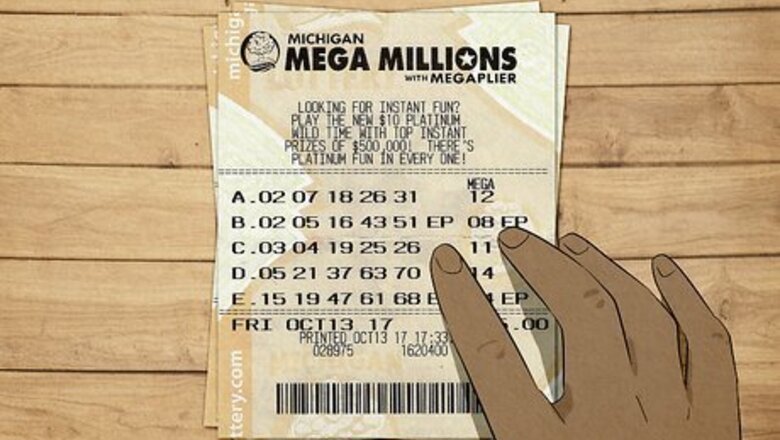
views
- To have a better chance of keeping an entire jackpot if you win it, choose random numbers that aren't close together—others are less likely to pick that sequence.
- Avoid playing numbers that have sentimental value, like ones associated with your birthday, because lots of people might have the same strategy.
- Buying more tickets can slightly improve your chances of hitting the jackpot. If you join a lottery group, pool money with others to purchase a large amount of tickets.
- Remember—every number has an equal probability of being chosen. There is no "lucky" number, so just have fun selecting ticket numbers and see what happens!
Selecting Ticket Numbers
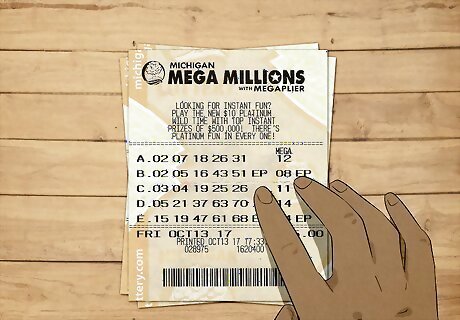
Choose from a wide range of the numbers available in the lottery. Most people play common numbers like their birth or anniversary date. Picking those “lucky” numbers might not be the best move since many lotteries include higher numbers other players tend to ignore. There are only 12 months and 31 days to pick from! You’re better off picking a mixed bag of low and high numbers instead of a few that are close together. Think of the odds, too—many people go for numbers that carry sentimental value. Even if you win, you might end up having to share the prize with them. For example, if a Mega Millions ticket requires 5 numbers between 1 and 70, you might play 1, 15, 36, 48, and 63. This is an example of a unique ticket with unrelated numbers that aren't close together—not a lot of people would intentionally pick these.
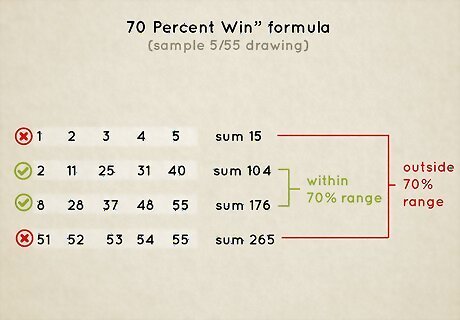
Use the “70 Percent Win” formula when adding up lotto numbers. To try out lottery expert Gail Howard’s strategy for finding a winning combination of numbers, make sure the sum of the numbers you play falls within the “70 Percent Most Probable Range of Sums.” Create a range with the lowest sum of all your lottery numbers as well as the highest sum, then choose combos of lottery numbers within that range. Consider a 5/55 drawing: 1+2+3+4+5=15 51+52+53+54+55=265 The lowest sum and the highest sum each only occur once. Your safest bet is to choose combinations of numbers with sums that aren’t 15 or 265. Studies suggest that the “70 Percent Range” for 5/55 includes sets of numbers that add up to sums between 104 and 176. If you don’t want to do any complicated calculations or buy any lotto software, just make sure the lottery numbers you add up don’t result in the lowest or highest possible sum for your drawing.
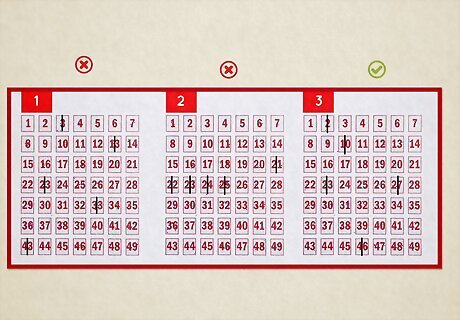
Pick different numbers without following a pattern. Since lotteries pull each lotto number from a range of numbers, they won’t be grouped up in any specific kind of order. For example, winning lottery numbers are unlikely to be clustered together as consecutive numbers (i.e., 1, 2, 3) or within the same number group (i.e. 42, 43, 44). If you write down a range of numbers that look random and don’t have an obvious pattern, then you’re on the right track. A winning ticket is unlikely to consist of a pattern like 3, 13, 23, 33, 43. It also isn’t likely to be a short range of numbers like 21, 22, 23, 24, and 25. While a series of numbers may look meaningful to you, like 22, 33, 44, and 55, they’re unlikely to all show up together when the winning lottery numbers are pulled. Mix up your ticket with both odd and even numbers. Although the winning numbers could be all odd numbers, for instance, it's unlikely.
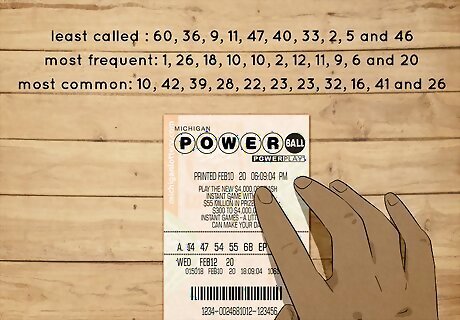
Choose the least called numbers in the lottery. If you don’t want to split your jackpot prize if you do win, pick the least called numbers, which other people aren’t likely to include on their ticket. However, if you want to go off of past patterns, consider choosing the most common (or frequently appearing) numbers or the most common primary numbers. Least called numbers in the Powerball: 60, 36, 9, 11, 47, 40, 33, 2, 5 and 46. Most frequently appearing Powerball numbers: 1, 26, 18, 10, 10, 2, 12, 11, 9, 6 and 20. Most common primary numbers in the Powerball: 10, 42, 39, 28, 22, 23, 23, 32, 16, 41 and 26.
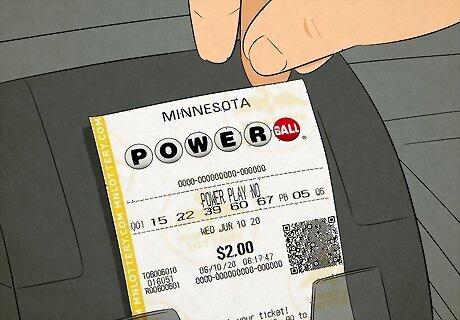
Use quick picks if you’re uncertain what numbers to play. Quick picks don't use any strategy when they're generated, but they can serve as a starting point when you’re new to a game. With a quick pick, the lottery machine selects numbers for you. Many people win this way, although the odds aren’t any different than when you pick your own numbers. Quick picks are random, so you know you will end up with a unique set of numbers no one else is likely to have. It has as much of a chance of winning a single drawing as a ticket you picked yourself. Quick picks save you time, but the machine doesn't calculate odds for you when it automatically prints out your ticket. Keep in mind that the sequence of numbers in quick picks are harder to remember than ones you play all the time.
Purchasing Tickets Strategically
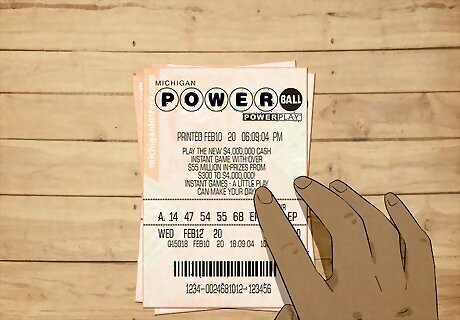
Buy as many tickets as you can to increase your odds of winning. Lottery experts agree that the number one way to boost your chance of getting a winning ticket is to just get more tickets. Even though the probability of winning the lottery is low in general, the greater the amount of tickets you have, the more likely it is that one of these tickets will be the winner. Just remember to play responsibly and to stay within your budget. Some people buy hundreds of tickets and lose. Remember that it's important to stay within your budget, because while the lottery is a fun game, you're not guaranteed to win money (even if you invested a lot of it stocking up on tickets). In the biggest lotteries, an unlimited number of tickets can be printed out for every possible number combination. It’d be extremely difficult to buy enough tickets to dramatically increase your odds of getting a winning ticket.
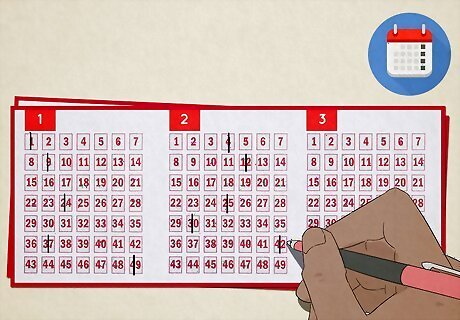
Play weekly for a low investment that may have a high return. Many lotteries have a drawing each week. Purchase a ticket before each new drawing in order to give yourself a shot at the jackpot. Harvard statistician, Professor Mark Glickman, pointed out that buying weekly tickets is a great strategy because it’s a relatively low investment (around $2 per week) that can lead to a huge pay off. If you keep buying weekly tickets and the jackpot continues to grow, then you have a greater chance of yielding a profit.
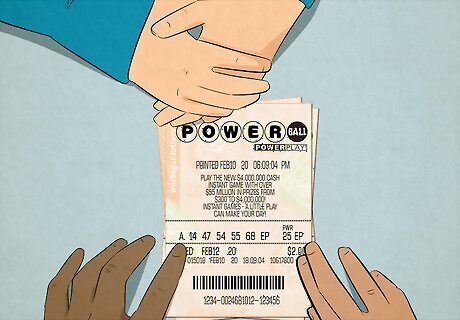
Join a lottery pool to purchase multiple tickets as a group. Organize a group at your office, school, church, or anywhere else you can find people willing to play. In a pool, or "lottery syndicate," everyone who joins agrees to buy at least one ticket. If someone wins, they split the money evenly with everyone else in the pool. Depending on how many people join the pool, you could accumulate a bunch of tickets without shelling out a lot of your own money. Keep in mind that the odds of a big jackpot are still very remote and, if you do win, you'll have to share the payout with everyone in the pool. Make sure someone trustworthy handles the money and tickets. Keep a photocopy of your ticket and receipt to ensure you have proof in case you win. To protect everyone in your lottery group, create a "syndicate agreement," a formal document that outlines the terms that each member agreed to.

Play less often if you're planning to chase a big jackpot. Instead of getting a ticket for every single drawing, save up to play for the big prize. If you’re accustomed to playing a game weekly, you could set aside your money until the payout gets bigger. That way, you get to have fun without spending more than you normally would. The extra tickets bump up your chances of winning very slightly. The odds of winning are still low no matter how many tickets you get, but this strategy could be fun for you if you’re really motivated by a big payout. Many lotteries, including big ones like Powerball, have a cumulative jackpot that grows when no one wins. For the best chance of winning money, do this for a smaller game with less participants, like a state pick-3. With bigger games like EuroMillions, your odds will still be very low.
Choosing Games to Play
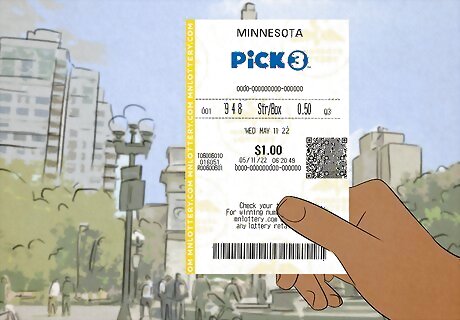
Invest in smaller lottery games with less numbers to choose from. When the jackpot climbs for the world’s biggest lotteries, most people forget about the smaller games. These games often have better odds and are more likely to pay out. Look for games that pick from a smaller set of numbers or fewer balls. The main trade-off is that these games pay less in prize money than the most popular games. Regional lottery games have better odds than big games like Powerball and Mega Millions. For example, try a state pick-3 game. You only have to pick 3 numbers to win instead of 5 or 6. The less numbers a game has, the less combinations there will be, so you're more likely to select a winning sequence.
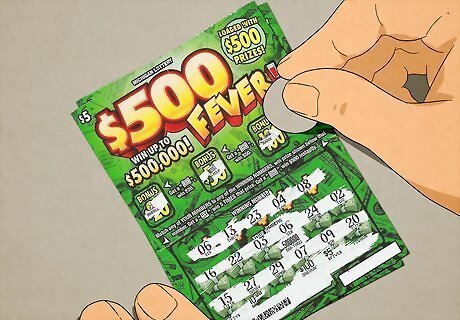
Purchase scratch cards for a quicker and simpler way to play. Many regional lotteries offer scratch-off games. These cards are instant and have better odds of awarding money than big lottery drawings. While the payouts tend to be on the lower side, you could still win a big cash prize if you’re lucky. Scratch cards are quick and accessible. Most lottery commissions have a number of different games to play. You could get cheap cards or play pricier games with bigger prizes. A typical scratch card offers 1:5 odds at best, meaning that 1 in every 5 cards is a winner. This could mean winning a prize of $1 USD or a big jackpot. It depends on the game.

Check your tickets for alternative ways to win. Everyone has their eyes on the jackpot, but many lottery games offer smaller prizes as well. Read up about the rules of the game. They are typically posted on your ticket or on the lottery’s website. Instead of assuming you lost, double-check your ticket and you might notice a fun surprise. For example, Powerball offers 9 ways to win. You can win a small prize by picking the number on the red ball. You could also win by picking 3 or more white ball numbers.











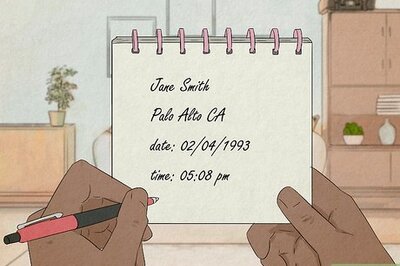
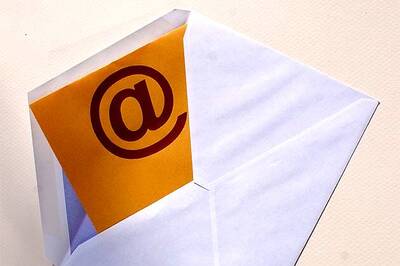



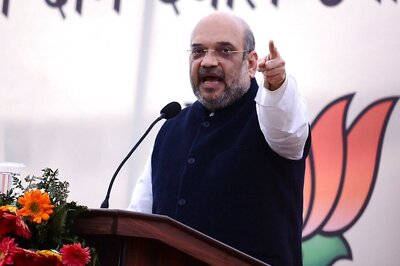



Comments
0 comment